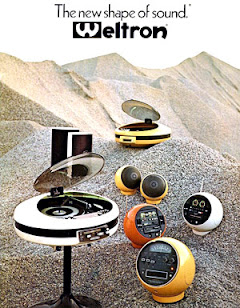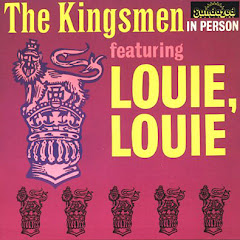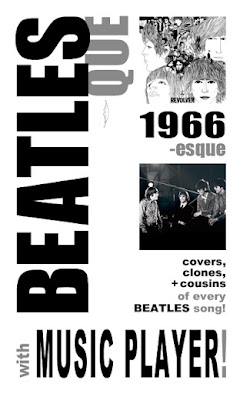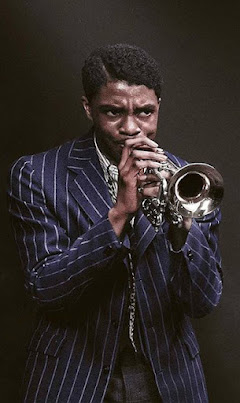...with 2 gigantic
Music Players!
RockSex
brings you the actual, all-inclusive
history of Rock'n'Soul music,
with essay overviews and Music Players.
▶ History Checklist
Today, the romp-bompin'
Bo Diddley, the baron of the beat!
Hear 2 massive music players, one of Bo and one of all his disciples from the 1950s to today!
Music Player quick-links:
𝟭 Bo Diddley
𝟮 Bo Diddley's disciples: 1950s-Today
𝟭
The Rhythm King
of Rock'n'Roll
BO DIDDLEY
by Tym Stevens
This is a Spotify player. Join up for free here.
It's that
rhythm.
It had been around before in variations. "Shave-and-a-haircut, two-bits." His band says it came from a song called
"The Hambone" (based on a rhythm and dance descended from the Juba dance of Haiti).
Bo Diddley says it actually came out of his love of the insistent cadence of Country & Western star
Gene Autry's
"I Got Spurs That Jingle Jangle Jingle" (1942). Anything comes from anywhere, it's all in how you use it.
Chess Records in 1955 Chicago was the home of the electric blues gods;
Howlin' Wolf,
Muddy Waters, their writer and bassist
Willie Dixon, harpist
Little Walter. Mature men from hard lives in the sharecropper South. When that gave out they migrated among millions to the Rust Belt states around the Great Lakes for factory jobs and record deals. Muddy's was the first all-electric Blues band, plugging Rock'n'Roll in in 1948. Wolf was the leer of the forbidden, crackling through the night airwaves. With the edgy
John Lee Hooker, they stoked the souls of rambunctious young listeners, squirming to bust out.
You can hear it on those first singles by the new upstarts at Chess; when
Chuck Berry> and Bo crashed the party, it was like someone had flung writhing livewires onto the dance floor crowd. There is a jolting rush and breakneck intensity to those songs that had never been there before. Suddenly the Blues seemed plodding by comparison. It is alive, rude, both mean and joyful. So fast and so fuzzed out it made everything else trip over itself tepidly. What the hell was this? That hard stomping snarl of
"Maybelline", that thundrous gallop and phasing tremolo of
"Bo Diddley".
BOOM-da-boom-boom, Da-BOOM-Boom. Dag!
Little Walter, Little Richard, Bo Diddley, Chuck Berry (1986)
Bo's sound was the past and the future. The crossroads.
It was tribal drumming under an eerie richochet of distorted guitar. In your midnight bedroom, preening your ear covertly to the alien voices sparking out of the radio static, it transported you to some beyonder badlands where mad hooves cascaded like hailstones.
BOOM-da-boom-boom, Da-BOOM-Boom. Above this thunderground shimmered an aurora of electronic reverb. Through this nether void Bo would ride hard on sheer pride. He was ego (
"I walked 47 miles of barbed wire/ Wear a cobra snake for a necktie"), identity (
"I'm a man/ I spell M-A-N"), insane (
"You shoulda heard just what I seen"), and hilarious (
"I came into this world playing a gold guitar!").
Surging sidesaddle was maraca man
Jerome Green, comedic foil and timekeeper. And whiplashing with him lick for lick was
Peggy "Little Bo" Jones, her guitar striding beside on
"Roadrunner",
"Pills", and
"Hush Your Mouth". After her came
Norma-Jean "The Duchess" Wofford to kick more ruckus. And Bo, a cracked inventer and inverter of sound with his square-box guitar he cobbled from stray junk. These incomparable compadres carried him through more classics than you can shake a drumstick at.
L: Peggy "Lady Bo" Jones;
R: Norma-Jean "The Duchess" Wofford
To reiterate, the M-A-N was adult enough to respect the women. Female guitarists of the era often got spotlight specifically as the singing front, but weren't routine band members. While Bo Diddley could have hogged the light, he instead had a woman in his band as his equal sparring partner, not once but twice. Bo knew that well-rounded inclusion was the right way to go.
That persona. That rhythm. That attack. That fusion of the earthy and the eerie. That booming voice on
"I Can Tell", that delirious giggle on
"The Story of Bo Diddley", that gutteral sneer on "Oh Yea", those mournful highs on
"Mona". What kid wouldn't fall in love with that? And around the world many did and would for years and years. The story of Bo Diddley would amplify every time a new movement plugged in a guitar.
When someone recently mentioned him in relation to the Blues, Bo calmly but clearly set them straight. "I'm not a Blues artist. I'm a Rock'n'Roller."
You're the Man. M-A-N.
2
Diddley Daddy:
The Disciples of Bo Diddley
Bo Diddley and The Clash
BO DIDDLEY
by Tym Stevens
This is a Spotify player. Join up for free here.
*(This Player is limited to the first 200 songs.
Hear the unlimited Playlist here.)
All songs in order from the 1950s to today.
40 hours and seven decades of music
influenced by Bo Diddley, including:
Buddy Holly • Muddy Waters • Etta James
Chuck Berry • The Coasters • Gene Vincent
Dick Dale • The Beatles • Booker T + The MGs
Lonnie Mack • The Crystals • The Byrds
The Yardbirds • The Animals • The Small Faces
The Supremes • Marvin Gaye • The Miracles
The Who • Bob Dylan • The Sonics
Stevie Wonder • James Brown • Cream
Sly And The Family Stone • The Meters • CCR
Led Zeppelin • Funkadelic • T.Rex
Capt. Beefheart • The Band • Al Green
David Bowie • The Stooges • The Stooges
ZZ Top • Roxy Music • Eno • Pointer Sisters
Elton John • Fleetwood Mac • Queen
The Clash • The Police • Iggy Pop
The B-52's • Cheap Trick • Motorhead
Blondie • Chic • The Slits • Gang Of Four
Pretenders • Talking Heads • John Lennon
The Kinks • The Go-Go's • Elvis Costello
Girlschool • Bruce Springsteen • Minutemen
The Cure • Los Lobos • Echo + The Bunnymen
The Smiths • Love And Rockets • Wire
Crowded House • Beastie Boys • U2
Happy Mondays • Stevie Ray Vaughan • Prince
Billy Bragg • Jane's Addiction• fireHOSE
The Gories • Lush • Thee Headcoats
Public Enemy • Throwing Muses • PJ Harvey
Meat Beat Manifesto • Cowboy Junkies
Consolidated • Tori Amos
Cocteau Twins • Living Colour • Lenny Kravitz
The White Stripes • Gorillaz • The Roots
Outkast • Fatboy Slim • Rihanna
Gogol Bordello • Tune-Yards
Thee Oh Sees • Amadou And Mariam
Ty Segall • Lykke Li • Las Pistolas
Summer Twins • Django Django • Bleached
Pond• Foxygen • Nicole Atkins
Whitehorse • Thee Tsunamis • The Coral
Dustaphonics • Los Mambo Jambo
Black Joe Lewis • Janelle Monae • Habibi
Holly Golightly • Bananagun • Larkin Poe
and many, many more!
The Riff that will not fade away.
Bo's 1950s
friends were the first to jibe handily with the hand jive.
Buddy Holly>, like Bo from South America (
"south Texas"), was among the first to give Bo the thumbs up weaving his rhythm into
"Not Fade Away".
Johnny Otis, famed Jump Jive bandleader, bumps it lively with his
"Willie And The Hand Jive",
Elvis Presley with
"His Latest Flame", and
Mac Rebbenack (a.k.a., Dr. John) with
"Storm Warning".
Gene Autry, Buddy Holly, Muddy Waters, Etta James
Bo had transmuted
Gene Autry and now others were transfiguring him. This is that fluid moment in creativity when a unique riff or beat transcends to a consensual
pattern -like the shuffle, the rhumba, the bossa nova, and the waltz- which pollinates laterally. Lawyers, accountants, and separatists aside, this is inevitable and natural. A creator does deserve credit for their efforts or innovations. But then every good idea takes on new lives in the responses of others.
Creativity is intrinsically cyclical and progressive, a crossroads relay of past and future.
Muddy Waters's
"Hoochie Coochie Man" (1954) had inspired Bo's
"I'm A Man". Muddy then answered Bo's song with his
"Mannish Boy" (1955), and later they did "I'm A Man" together with
Little Walter (1967). And
Etta James set them all straight with
"W-O-M-A-N".
While Bo took great pains to distinguish himself as a Rocker instead of a
Blues man in the press, his influence still reverberated through bluesers anyway. Straight away with peers like
Howlin' Wolf,
Junior Wells and
Buddy Guy,
Slim Harpo, and
John Mayall And The Bluesbreakers. And across the decades with noted successors like
Delbert McClinton,
Koko Taylor,
Roy Buchanan,
Marcia Ball, and
Joe Ely. Nurtured by the Blues, Bo in turn bolstered the Blues.
Blues and
Country have always been intertwined, constantly trysting into new forms. Pulsing with Bo's beat were rural stalwarts like guitarist extraordinaire
Chet Atkins, balladeer
Tom Rush, and sassy
Jeannie C. Riley. It throbbed in the pensive
Folk of
Simon And Garfunkel, and the devil-may-care
Country Rock of
The Flying Burrito Brothers. In time, Bo's surge coursed through notables like
Jerry Reed,
Jim Stafford, and songwriter
Townes Van Zandt.
As the original big bang of
Rock> surged into early-'60s
Surf>, Bo's sense of rhythmic propulsion undergirded the rumbling attack of Surf and Hot Rod instrumentals. Rolling through the tidal roar were
Dick Dale's
"Surfin' Drums",
The Imps "That'll Get It", and
Lonnie Mack's
"Memphis". Bo's crosscurrents lifted acts like guitar acts like
The Sentinels,
Surfers De Los Campeones, and
The Bobby Fuller Four. Our man Bo even did a 1963 album responding back called
"Surfin' With Bo Diddley". (Ax murderer
Link Wray foreshadowed Punk in 1962, churning through a hyperspeed
"Bo Diddley" like his sleeves were burning.) In covers, homages, or in sonic spirit, Bo's influence was now encoded in Pop's DNA.
For proof of that in unexpected places, listen to the Beat's cadence in Leonard Bernstein's score for WEST SIDE STORY
(1960), in the song
"Act 1: America".
Lonnie Mack, Marvin Gaye, Olivia Molina, The Pretty Things
It hipshakes through
Soul> in hits like
The Dixie Cups'
"Iko Iko",
The Shangri-Las'
"Simon Speaks", and
Shirley Ellis'
"The Clapping Song" (and
Olivia Molina's cover version,
"Juego De Palabras"). BOOM-da-boom-boom, Da-BOOM-Boom.
King Curtis,
Bobby "Blue" Bland,
Ben E. King,
Doris Troy,
Roy Head. And later in the '70s, still oscillating unexpected behind
O.V. Wright,
The Jackson 5,
Lloyd Price,
Betty Wright,
The Spinners, and
Willie Hutch.
It became the go-to beat at
Motown for awhile, propelling classic songs like
Smokey Robinson And The Miracles'
"Mickey's Monkey",
Marvin Gaye's
"Baby, Don't You Do It", The Supremes'
"When The Lovelight Starts Shining Through His Eyes", and The Marvelettes'
"He's A Good Guy (Yes, He Is)". It was used so much, they had to vary up and re-interpolated it as a new signature beat, starting with The Supreme's
"You Can't Hurry Love", which launched hundreds more songs.
England always values our culture better than we do. From their perspective the Blues masters and the rocker rogues were gods raining from Olympus in sheaths of steam. The resultant mid-'60s
British Invasion> was the second ring of the big bang, and Bo's beats pulsared through it as much as Chuck's comet flares. You can clearly hear Bo's influence on
The Beatles'
"I Want To Be Your Man", written for
The Rolling Stones, who then had a big big breakthrough covering Buddy Holly's
"Not Fade Away" with extra emphasis on Bo's beat. Their tougher older brothers,
The Pretty Things, took their name from Bo's song and his rhythm for their classic
"Rosalyn". (Then later, Bowie borrowed their name for three songs and covered "Rosalyn"!)
The Animals made up a fake tale of meeting him in their homage to his mythos,
"The Story of Bo Diddley".
The Liverbirds' sent a father's day card covering
"Diddley Daddy".
Manfred Mann (covering The Exciters) practically name-check him with their hit,
"Do Wah Diddy Diddy". The thump pumps up other songs by
The Moody Blues,
Donovan (Scotland), and
Them (Ireland).
Bo's strut further disordered borders
worldwide with artists like
Jacques Dutronic (France),
Owe Thornqvist (Sweden),
Les Chaussettes Noires (France),
The Rattles (Germany),
Moğollar (Turkey),
Lone Star and
Els Xocs (Spain),
Los Rockin' Devils (Mexico),
Roland Alphonso and
Laurel Aitken and
Dawn Penn (Jamaica), and
The Brims (Indonesia). A rhythm is beyond limits, language, time, fashion, and expiration.
As the bluesy vamps of The Stones,
The Yardbirds,
The Animals,
The Kinks, and The Pretty Things snarled their way into the emerging
Garage Rock>, Bo's legacy blew cheap speakers in rehearsals worldwide. English bands like
Stovepipe No. 4 (
"Pretty Thing"),
Rey Anton And The Peppermint Men (
"You Can't Judge a Book"), and
The Who (Jerome's maracas live in their
"Magic Bus"). American bastards like
The Juveniles (
"Bo Diddley"), the garage gods
The Sonics (
"Diddy Wah Diddy"), and
The Preachers (who throw some immortal 'twist-and-shreik!' into their
"Who Do You Love" cover) all bomped the bomp.
If
"Johnny B. Goode" was now the Rock in all solos, then Bo's beat was the Roll in all rhythm sections.
Thee Midniters,
Buffalo Springfield,
The Strangeloves,
The 13th Floor Elevators,
The Remains,
The Shadows Of Knight,
El Xocs (Spain), and
The Iguanas (with young Iggy Pop on drums).
Once a template becomes universal, it expands beyond its mandate. Besides covers and clones, the Beat was now splicing into interpolated
cousins, the natural course of all creative response. Most famously,
The Strangeloves stomped the streets with their beat repeat
"I Want Candy", a hit that would keep on hitting in future cover versions.
The Byrds married The Beatles' "I've Just Seen a Face" to Bo's beat with their
"Don't Doubt Yourself, Babe".
Bob Dylan brought it all back home to Jerome with
"Maggie's Farm".
Bob Dylan, The Strangeloves, The Who, The Stooges
The roar and fuzz of Garage Rock splayed out into the multi-facets and flange of
Psychedelic Rock>, and the Love-In for Bo's tremolo was abstracted into new songs by
Jefferson Airplane,
The Chocolate Watchband,
The West Coast Experimental Band, and
Traffic.
As the boisterous social revolution escalated in the late'60s, music got rougher and wilder and angrier with
Hard Rock. In came insurgents like
Captain Beefheart And His Magic Band, screaming Howlin' Wolf in Bo's clothing with their corrosive cover of
"Who Do You Love". Soon enough
The Doors expanded that song into a panting rant in panavision. Hard on their heels bristling with fury and ennui were the
The Stooges with their homages
"Little Doll" and
"1969", stripping the excesses of Psychedelia down to a primal, throbbing buzz that would invent Punk. (In later years, Iggy wrote a loving essay about Bo for Rolling Stone magazine: "Bo's hands are about a foot long from the wrist to the tip of the finger. He really controls his guitar." It's all about concentrated chaos.)
If the Beat had been about dance or groove before, it was now about sex and triumph. It is the thunderous hooves of artists such as
Cream,
Steppenwolf,
MC5, and
Flower Travellin' Band, cresting over the ridge on stallions, screaming. Or cruising on a chopper, flipping you off.
As the revolution absorbed in to society to seed the future, a back-to-basics perspective took over the new decade. As early-'70s
Glam vamped on '50s Rock
>,
David Bowie expressed that pulse as
"Panic In Detroit", The
New York Dolls spilled their ills with his
"Pills" in 1973, and Bo footed the platform for songs by
Fancy,
Roxy Music,
Brian Eno, and
The Sweet. His pattern also pulsed laterally in unexpected parts, like
Joni Mitchell's
"Big Yellow Taxi" and
Jethro Tull's
"Aqualung", in the Funk-Rock of
Mother's Finest and the Swamp Rock of
Little Feat and the Prog-pomp of
Queen.
David Bowie, Talking Heads, The Slits, Bow Wow Wow
Clearing out all excesses,
Pub Rock stripped everything back to '50s Rock and '60s Soul basics. The English movement was spearheaded by dissenters like
The Count Bishops,
Dr. Feelgood,
The 101ers (with Joe Strummer), and
Kilburn And The High Roads (with Ian Dury), profiling like Teddy Boys and twisting like Northern Soul 45s. As it was endlessly reverbed, Bo's Beat became a signifier of furtile evolution, the metronomic verse of a griot telling the history of Rock and all of its turnovers.
When late-'70s
Punk turned the basics into bombast, they were also aflame with the direct fury of '50s Rock. Chuck and Bo's riffs ricocheted through reverb in squalid alkie-holes planetwide all over again. On
The Clash's first tour of America, they insisted that Bo Diddley be their opening act. "Every time I look at him, my jaw just drops," said Joe Strummer. It was a middle-finger salute to their coked-and-clueless record label and a laurel leaf to their Dionysus. Their songs
"Hateful" and
"Rudie Can't Fail" pound with the maestro's pulse. It quickens the blood of compatriots in subversion like
Johnny Thunders,
Generation X (with Billy Idol),
Buzzcocks,
The Fall, and
Pretenders. That ferocious pound echoes again in
Minutemen's
"Case Closed",
Husker Du's
"Hare Krsna", and songs by
X,
Throwing Muses, and
Jane's Addiction. In 1987 the
Jesus And Mary Chain declared in wax their proclamation that
"Bo Diddley Is Jesus".
The impulse of
PostPunk bands to marry primal
polyrhythms with sharp abrasive textures, such as
The Slits,
Talking Heads,
Gang Of Four,
Bush Tetras,
Adam And The Ants, and
Kleenex/LiliPUT, is Bo's crossroads recrossed again.
As the '80s went progressively slicker than oil wells, multiple creative undergrounds rejected it for the raw, the classic, the felt. The Beat animated
Power Pop acts such as
Nick Lowe,
The Knack,
20/20,
The Soft Boys (with Robyn Hitchcock),
Cheap Trick,
The Romantics, and
The dB's. It kicked up new ground in
Roots Rock by
The Del Fuegos,
Lone Justice,
Buckwheat Zydeco, and
Steve Earle. There it is stalking
Rockabilly by new cats in the alleys like
Sleepy LaBeef,
Hank C. Burnette,
The Bopcats,
The Meteors,
Big Daddy, and
Chris Isaak. That's it spiking the
Psychobilly of miscreants like
Batmobile,
Torment, and
Furious, and the
Trashabilly of
Flat Duo Jets,
Bodeco,
Oblivians, and
Dex Romweber. Colluding secretly with
The Cure,
The Smiths, and
Billy Bragg. Electrifying the Go-Go with new
Garage Rock from
The Milkshakes,
Thee Mighty Caesars,
The Times,
Hoodoo Gurus (Australia), and
The Smithereens. It has become the underlying codex of cadence.
The
mainstream wasn't safe either.
Bow Wow Wow made it big on their cover version of a swipe, with The Strangeloves'
"I Want Candy". '80s kids didn't know to judge a beat by its cover because it was too busy moving their backsides. And did so again with
George Michael's
"Faith". It strobes through
Lyndsey Buckingham's swirling
"Loving Cup" and
The Smiths' amazing
"How Soon Is Now" U2's heart bumpathumped with
"Desire".
Chris Isaak may have been Elvis Orbison, but he still brought it to Jerome with his take on
"Diddley Daddy" in '89.
Guns'n'Roses free-bass'ed it as
"Mr. Brownstone".
In
HipHop,
Public Enemy's radical cocktail of hardbumping rhythms with sheets of flanging noise is the very spirit of Bo. (Chuck D is a deep fan of the pychedelic Chess albums of Wolf and Waters, and Bo in his SM fetish belts on 1970s
"Black Gladiator" cover freaked him out). Deconstructing the past reconstructs the future, as proven by acolytes like
3rd Bass,
Consolidated, and
Fatboy Slim.
Public Enemy, The White Stripes, Janelle Monae, The Love Me Nots
As a pattern beat or polyrhythmic approach, Bo's hooves steadily galloped through the '90s and '00s. The beat was a pathway, of knowing where you came from to know where to go next. And to spite any currently popular trails you didn't want to go near. Whether
Dick Dale,
The Gories,
Shonen Knife,
The White Stripes,
Gorillaz,
54 Nude Honeys,
tUnE-yArDs,
Ty Segall,
Janelle Monae,
Bleached, or
The Love Me Nots, the original primal beat of Rock'n'Roll strode on and on...
It's that rhythm. The riff that will not fade away.
BOOM-da-boom-boom, Da-BOOM-Boom. This is the continuing story of Bo Diddley...
"Bo Diddley", by Peter Blake (1963)
©
Tym Stevens
See Also:
•
Revolution 1950s: The Big Damn Bang of Rock'n'Roll!
•
1950s PUNK: Sex, Thugs, and Rock'n'Roll!
•
CHUCK BERRY: The Guitar God and His Disciples
•
BUDDY HOLLY: Rock's Everyman and His Disciples
•
LITTLE RICHARD: The Voice of Rock and His Disciples
•
JIMMY REED: The Groover of Rock, From Motown To Sesame Street
_____________________
•
1950s Rock, A: The '60s Disciples, with Music Player!
•
1950s Rock, B: The '70s Disciples, with Music Player!
_____________________
•
The Real History of Rock and Soul!: A Manifesto, A Handy Checklist




































































































































































